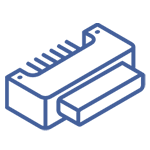

Amphenol D38999/33-K-21-R
Manufacturer No:
D38999/33-K-21-R
Tiny WHSLManufacturer:
Utmel No:
143-D38999/33-K-21-R
Package:
-
Description:
DUST CAP
Quantity:
Unit Price: $34.193413
Ext Price: $34.19
Delivery:





Payment:











In Stock : 19
Minimum: 1 Multiples: 1
Qty
Unit Price
Ext Price
1
$34.193413
$34.19
10
$32.257937
$322.58
100
$30.432016
$3,043.20
500
$28.709449
$14,354.72
1000
$27.084386
$27,084.39
Want a lower wholesale price? Please send RFQ, we will respond immediately.
RFQ Now
Add to RFQ list
You may place an order without registering to Utmel.
We strongly suggest you sign in before purchasing as you can track your order in real time.
For your convenience, we accept multiple payment methods in USD, including PayPal, Credit Card, and wire transfer.
RFQ (Request for Quotations)It is recommended to request for quotations to get the latest prices and inventories about the part.
Our sales will reply to your request by email within 24 hours.
1. You'll receive an order information email in your inbox. (Please remember to check the spam folder if you didn't hear from us).
2. Since inventories and prices may fluctuate to some extent, the sales manager is going to reconfirm the order and let you know if there are any updates.
- TypeParameter
- Mounting Type
The "Mounting Type" in electronic components refers to the method used to attach or connect a component to a circuit board or other substrate, such as through-hole, surface-mount, or panel mount.
Panel Mount, Through Hole - Mounting Feature
a process by which the operating system makes files and directories on a storage device (such as hard drive, CD-ROM, or network share) available for users to access via the computer's file system.
Flange - Shell Material
The "Shell Material" parameter in electronic components refers to the material used to encase or cover the internal components of the device. This material is chosen based on various factors such as durability, heat resistance, electrical insulation properties, and environmental considerations. Common shell materials include plastics, metals, and ceramics, each offering different levels of protection and performance characteristics. The choice of shell material can impact the overall reliability, safety, and functionality of the electronic component in different operating conditions.
Aluminum - Material
In electronic components, the parameter "Material" refers to the substance or material used in the construction of the component. The choice of material is crucial as it directly impacts the component's performance, durability, and other characteristics. Different materials have varying properties such as conductivity, resistance to heat, corrosion resistance, and mechanical strength, which determine how the component functions in a circuit. Common materials used in electronic components include metals like copper and aluminum, semiconductors like silicon, insulators like ceramics and plastics, and various alloys. Selecting the appropriate material is essential for designing reliable and efficient electronic components.
Stainless Steel - PackageRetail Package
- Primary MaterialMetal
- MfrGlenair
- Product StatusActive
- Contact MaterialsCopper Alloy
- Contact Finish MatingGold
- For Use With/Related ProductsMIL-DTL-38999 Series III Receptacle
- Shell Sizes21mm
- Operating Temperature
The operating temperature is the range of ambient temperature within which a power supply, or any other electrical equipment, operate in. This ranges from a minimum operating temperature, to a peak or maximum operating temperature, outside which, the power supply may fail.
-65°C ~ 175°C - Series
In electronic components, the "Series" refers to a group of products that share similar characteristics, designs, or functionalities, often produced by the same manufacturer. These components within a series typically have common specifications but may vary in terms of voltage, power, or packaging to meet different application needs. The series name helps identify and differentiate between various product lines within a manufacturer's catalog.
806 - Termination
Termination in electronic components refers to the practice of matching the impedance of a circuit to prevent signal reflections and ensure maximum power transfer. It involves the use of resistors or other components at the end of transmission lines or connections. Proper termination is crucial in high-frequency applications to maintain signal integrity and reduce noise.
Solder - Connector Type
Connector Type in electronic components refers to the specific design and configuration of the connector used to establish electrical connections between different devices or components. This parameter describes the physical shape, size, and layout of the connector, as well as the number and arrangement of pins or contacts. Common connector types include USB, HDMI, RJ45, and D-sub connectors, each serving different purposes and applications. Understanding the connector type is crucial for ensuring compatibility and proper functionality when connecting electronic devices together.
Plug, Male Pins - ColorSilver
- Gender
In the context of electronic components, the parameter "Gender" typically refers to the physical characteristics of connectors or interfaces that determine how they can be mated together. Connectors are often designed with specific gender types, such as male or female, to ensure proper alignment and connection between devices. A male connector typically has protruding pins or plugs that fit into a corresponding female connector, which has receptacles or sockets to receive the pins. This design helps prevent incorrect connections and ensures a secure and reliable electrical connection. Understanding the gender of connectors is crucial when designing or assembling electronic systems to ensure compatibility and proper functionality. It is essential to match the gender of connectors correctly to avoid damage and ensure optimal performance of the electronic components.
Receptacle - Fastening Type
There are 5 Main Types of Fastening Type: Screws, Nails, Bolts, Anchors, Rivets.
Threaded - Orientation
In electronic components, the parameter "Orientation" refers to the specific alignment or positioning of the component with respect to its intended installation or operation. This parameter is crucial for ensuring proper functionality and performance of the component within a circuit or system. Orientation may include factors such as the physical orientation of the component on a circuit board, the direction of current flow through the component, or the alignment of specific features or terminals for correct connection. Manufacturers often provide orientation guidelines in datasheets or technical specifications to help users correctly install and use the component. Paying attention to the orientation of electronic components is essential to prevent errors, ensure reliability, and optimize the overall performance of electronic devices.
E - Military Standard
Military Standard in electronic components refers to a set of guidelines and specifications established by the military for the design, manufacturing, and testing of electronic devices used in military applications. These standards ensure that the components meet specific requirements for reliability, durability, performance, and environmental conditions. Components that meet military standards are often more rugged and capable of withstanding harsh operating conditions such as extreme temperatures, vibrations, and electromagnetic interference. Adhering to military standards helps to ensure the quality and consistency of electronic components used in critical military systems and applications.
MIL-DTL-38999 - Shell Finish
Shell Finish in electronic components refers to the surface treatment or coating applied to the outer shell or casing of the component. This finish is designed to provide protection against environmental factors such as moisture, dust, and corrosion, as well as to enhance the component's appearance. Common types of shell finishes include nickel plating, anodizing, powder coating, and epoxy resin coating. The choice of shell finish depends on the specific requirements of the component, such as the operating environment, durability needs, and aesthetic considerations.
Nickel/PTFE - Shell Size - Insert
The parameter "Shell Size - Insert" in electronic components refers to the physical size of the connector shell or housing that holds the insert or contact arrangement within the component. The shell size is typically specified by a numerical designation that corresponds to a specific size and configuration of the connector. This parameter is important for ensuring compatibility and proper fit between different components or devices that use the same type of connector. Manufacturers provide detailed specifications for shell size to help users select the appropriate connector for their specific application requirements.
21 - Accessory Type
Accessory Type in electronic components refers to additional items or attachments that enhance the functionality or usability of primary components. These can include connectors, adapters, mounting hardware, and protective casings. Accessory Types are essential for ensuring compatibility and achieving optimal performance in electronic systems.
Cap (Cover), Dust - Features
In the context of electronic components, the term "Features" typically refers to the specific characteristics or functionalities that a particular component offers. These features can vary depending on the type of component and its intended use. For example, a microcontroller may have features such as built-in memory, analog-to-digital converters, and communication interfaces like UART or SPI.When evaluating electronic components, understanding their features is crucial in determining whether they meet the requirements of a particular project or application. Engineers and designers often look at features such as operating voltage, speed, power consumption, and communication protocols to ensure compatibility and optimal performance.In summary, the "Features" parameter in electronic components describes the unique attributes and capabilities that differentiate one component from another, helping users make informed decisions when selecting components for their electronic designs.
Ground


















